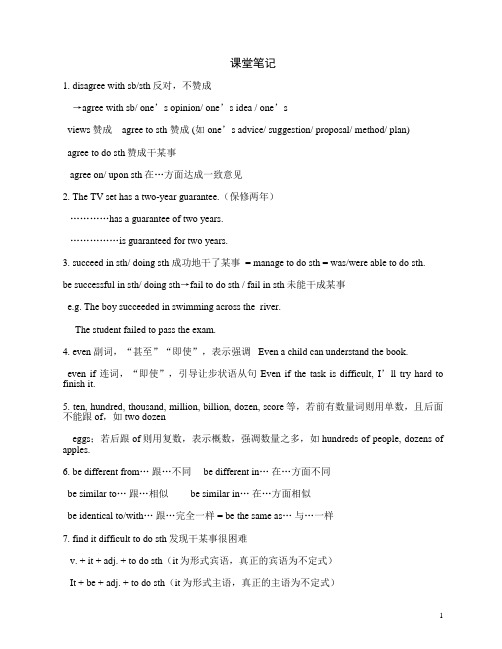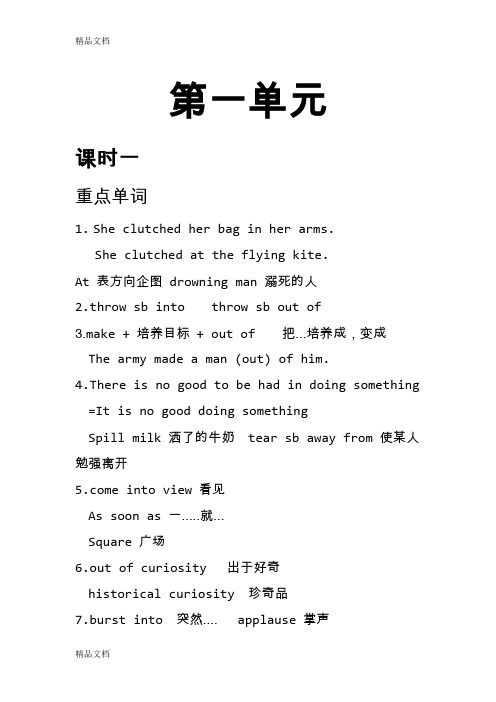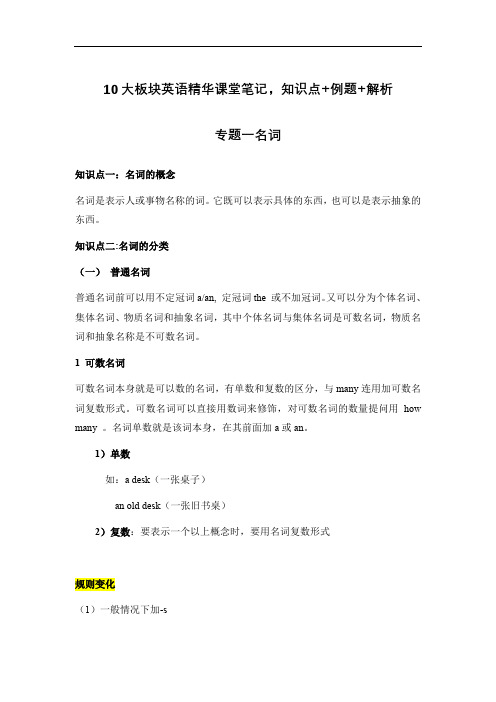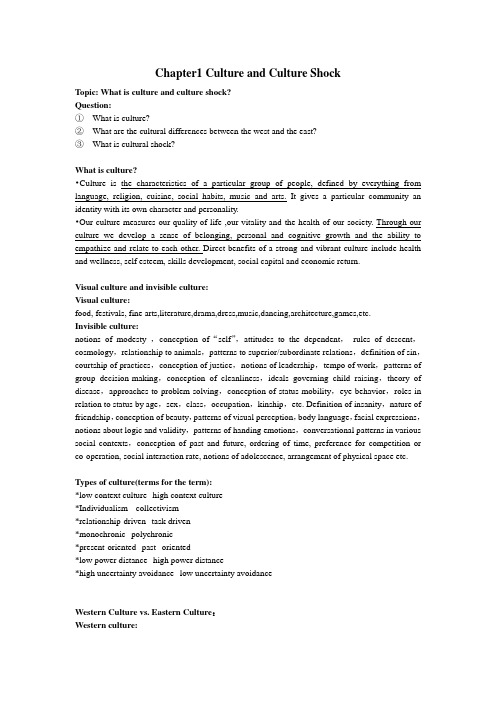专业英语课堂笔记
学好英语如何做课堂笔记

学好英语如何做课堂笔记老师在课堂上为我们指点迷津,传授新知,作为学生,我们不仅要竖起耳朵,也要勤于动手哦!准备好一个笔记本,随时把老师讲授的重点记下来吧!一个高质量的笔记一定会让你的学习事半功倍!那么如何更好地记课堂笔记呢?下面是小编为您收集整理的如何做课堂笔记,供大家参考!如何做课堂笔记Get Ready to Take Notes (Before Class)课前准备笔记Review your notes from the previous class session before you come to class. This will help you remember what was covered and get you ready to understand new information your teacher provides.上新课之前,先回顾一下上堂课的笔记。
这样既可以复习已学的内容,又能为吸收新的知识做好准备。
Complete all assigned readings before you come to class. Your teacher will expect that you have done this and will use and build upon this information.上新课之前,完成老师布置的阅读作业。
你的老师希望你能够认真完成它,因为在学习新课时,会用到这些阅读材料。
Bring all note-taking materials with you to class. Have several pens and pencils as well as your notebook.把所有记笔记需要用到的物品带好:准备几只钢笔和铅笔,还有笔记本。
Take Notes (During Class)课堂记录笔记Keep your attention focused on what your teacher is saying. Listen for "signal statements" that tell you what your teacher is about to say is important to write in your notes. Examples ofsignal statements are "The most important point..." and "Remember that..." Be sure to include in your notes information that your teacher repeats or writes on the chalkboard.上课时认真听讲,保持注意力的集中。
自考“英语(一)”课堂听课笔记第六章(2)

自考“英语(一)”课堂听课笔记第六章(2)〔人脑的奇特构造吸引了许多领域的研究人员。
〕13. pipe n. 管子,导管;烟斗v.用管道输送Tell the pipelayer that he has to be careful with the gas pipe.〔告诉管道安装工煤气管道要小心。
〕The old man was sitting in the corner smoking a pipe.〔阿谁白叟坐在角落里抽着烟斗。
〕It won’t be ver y troublesome to pipe water into the house.〔用管道把水送进屋里不会很麻烦。
〕14. somewhat adv. 稍微,有点It is somewhat difficult for him to answer the question.(要他回答这个问题有点难。
)I felt somewhat awkward when I couldn’t remember his name.〔当我记不起他的名字时,我有点尴尬。
〕The working conditions in this factory have somewhat improved.〔这家工厂的工作条件已有所改善。
〕15. blast n. 疾风,强风;爆炸v.炸,炸掉A blast of cold air sent a shiver all over his body.〔一股冷气使他浑身战栗。
〕Furious blasts of thunder frightened everybody.〔一阵阵的霹雳炸雷吓坏了所有的人。
〕The driver blasted the horn continuously.〔司机不断地按喇叭。
〕Rock music blasted from the hall and the whole building seemed to be shaking.〔震天的摇滚乐从客厅传来,整座房子似乎都在摇动。
英语课堂笔记

英语课堂笔记部门: xxx时间: xxx整理范文,仅供参考,可下载自行编辑Text A Why Are Maps Drawn with North at the Top?本课主要单词1.feature n. 特征,特色;面貌,相貌vi. 是…的特色,以…为特色vi. 重要作用;作为主要角色b5E2RGbCAP1)The most important feature of our work is parentalinvolvement.<我们工作的最重要特色是父母参与。
)p1EanqFDPw 2)The island's chief feature is itsbeauty.<这个岛的主要特色是风景秀丽。
)DXDiTa9E3d3)He is very familiar with the geographical featuresof thisdistrict. <他对这一地区的地理特征很熟悉。
)RTCrpUDGiT4)The boy was slightly taller than his father, withfine features.<那个男孩比他父亲稍高,长得眉清目秀。
)5PCzVD7HxA5)Round-the-clock service features thisstore.<日夜服务是这家商店的特色。
)jLBHrnAILg6)The new type of car features high speed, small sizeand low cost.xHAQX74J0X<这种新型汽车以高速、小型和低费用为特色。
)7)Sea food features largely in the diet of thesepeople.<海产在这些人的食物中占重要地位。
)LDAYtRyKfE8)He is featuring in a new movie.<他正在一部新片中担任主角。
全国教师继续教育笔记(英语学科)

英语教师继续教育学习笔记(专业课)小学英语教师教学业务学习(一)如何培养学生学习英语的兴趣基础教育阶段英语课程的任务之一是激发和培养学生学习英语的兴趣。
你认为在课堂上,应采取哪些措施激发和培养学生学习英语的兴趣?人们常说,兴趣是最好的老师。
那么到底什么是兴趣------这位最好的老师呢?心理学家认为:兴趣是学生渴求获得知识,探究某种事物或参与某种活动的积极倾向。
学习兴趣是推动学生学习的有效动力,是学习动机中最现实、最活跃的心理因素。
所以说,激发学生学习英语的兴趣是非常重要的,它可以让英语教学达到事半功倍的效果。
英语课堂教学是激发学生学习兴趣、提高学生参与行为的最重要的场所。
那么怎样来激发学生学习兴趣,以提高英语课堂教学的效果呢?我认为要运用多种教学方法,通过多种教学途径利用多种教学手段来激发学生的学习兴趣。
一、尽量使用英语来组织课堂教学英语教学的目的是培养学生运用英语的能力。
这种能力只有在大量接触英语,并沉浸到使用当中去,才能较快地培养起来。
用英语组织课堂教学,可以烘托课堂气氛,让学生感知英语,把学生放在一个英语环境里,用英语的语音、语调激发学生学习英语的兴趣,设法创设英语情景和气氛,使学生宛如臵身于一种真实的语言环境中,这样学生就能自然而然地养成用英语表达自己的思想、感情的习惯,增强学生的求知欲,并在无意中强化学生的听说能力,集中学生的学习注意力,兴趣也就由此产生。
二、尽量组织好一堂课前几分钟的内容俗话说:好的开始是成功的一半(A good beginning is half done)。
一堂课的开端好,也等于是整堂课成功了一半。
心理学上认为,注意是掌握知识、从事实践活动必不可少的条件,它使人感受性提高,知觉清晰,思维敏捷,从而使得行动准确、及时。
一个良好的开端将会把学生的注意力吸引到老师这里来,也将会给整堂课带来活力和朝气,带来学生热情参与的气氛,从而营造一个活泼、精神振奋,气氛活跃的课堂环境,而这样的课堂环境是激发学生学习兴趣的极为重要的因素。
英语课堂笔记24

Text A saving the rainforests for future generations本课主要单词1. rainforest n. 热带雨林这是一个由名词rain加名词forest构成的复合名词。
用rain加名词构成的复合名词,英语中还有不少。
如:rainbelt (雨带),rainworm (蚯蚓)等等。
2. economic adj. 经济(上)的,经济学的economic是economy的形容词形式,economical也是economy的形容词形式,请看下面的例句,注意区别economic和economical。
1)economic:concerned with economics and with the organization of money industry, and trade of a country, region, or social groupeconomic growth (经济增长) economic prosperity (经济繁荣)economic decline (经济衰退) economic reform (经济改革)economic order (经济秩序) economic depression (经济萧条)economic crisis (经济危机) economic doctrines (经济学说)2)economical:cheap,careful,efficientThis car is economical to run. (开这辆车费用很省。
)The child is so economical that he saves all his pocket money. (那个孩子很节省,他把零花钱都积攒了起来。
)形容词economic和economical的副词形式都是economically。
This region is unevenly developed economically. (这一地区的经济发展不平衡。
自考英语2课堂笔记

课堂笔记1. disagree with sb/sth反对,不赞成→agree with sb/ one’s opinion/ one’s idea / one’sviews赞成 agree to sth 赞成 (如one’s advice/ suggestion/ proposal/ method/ plan)agree to do sth赞成干某事agree on/ upon sth在…方面达成一致意见2. The TV set has a two-year guarantee.(保修两年)…………has a guarantee of two years.……………is guaranteed for two years.3. succeed in sth/ doing sth 成功地干了某事 = manage to do sth = was/were able to do sth.be successful in sth/ doing sth→fail to do sth / fail in sth未能干成某事e.g. The boy succeeded in swimming across the river.The student failed to pass the exam.4. even 副词,“甚至”“即使”,表示强调 Even a child can understand the book.even if 连词,“即使”,引导让步状语从句Even if the task is difficult, I’ll try hard to finish it.5. ten, hundred, thousand, million, billion, dozen, score等,若前有数量词则用单数,且后面不能跟of,如two dozeneggs;若后跟of则用复数,表示概数,强凋数量之多,如hundreds of people, dozens of apples.6. be different from…跟…不同 be different in…在…方面不同be similar to…跟…相似 be similar in…在…方面相似be identical to/with…跟…完全一样 = be the same as…与…一样7. find it difficult to do sth发现干某事很困难v. + it + adj. + to do sth(it为形式宾语,真正的宾语为不定式)It + be + adj. + to do sth(it为形式主语,真正的主语为不定式)e.g. It is necessary to learn a foreign language.→ I think it necessary to learn a foreign language.8. conversely = on the contrary = on the other hand相反地9. offer/give advice to sb = offer/give sb advice给某人提意见或建议 + on sth/ how to do sthe.g. The teacher offered us some advice on how to learn English well.→take/follow one’s advice接受忠告advise sb to do sth建议某人干某事→ advice sb against doing sth建议某人不要干某事10. as…as one can/could = as…as possible尽可能e.g. The thief ran as fast as possible/ he could.We should read as many books as possible/ we can.11. practice doing sth12. play with sth/sb 玩弄,玩耍 (e.g. fire, toys, women)13. first of all 首先 = above all14. depend on/upon = be dependent on/upon 依赖,依靠→one’s dependence on/upon… cf. be independent of不依赖,独立→the independence from…e.g. We don’t depend on our parents = We are not dependent on our parents.→ We are independent of our parents./ We want to get independence from our parents.15. They do not depend on the book or the teacher.在否定句或疑问句中必须用or连接,表示并列,虽译为“和”16. discover发现(已有的事物) invent发明(尚无的事物)17. instead of介词短语,instead副词,都表示“不是…而是…”“而不是…”,常可转换。
专科英语课堂笔记

4月20号:重点是辅音音标:见课本P2 元音、辅音表1、首先学会按照元音来划分音节。
在26个字母中,a 、e、i 、o 、u 5个字母为元音字母。
只有1个元音的属于单音节词,有2个元音属于的是双音节词,有3个元音的属于元音的属于3音节词,有3个以上元音的属于多音节词。
4月23号bottle s swim s basin s浊辅音加s 读音为[z] map s清辅音加s 读音为[s]2、开音节:元音字母+辅音字母+不发音的e 比如:date [deit]中的e 不发音、life、nice以元音字母结尾:入to he闭音节:元音字母+辅音字母=闭音节(无不发音的e) win get区分开音节闭音节的意义:1,重读:开音节:重读的时候元音发音标本音闭音节:重读的时候不发字母的本音。
2,词性的转变:如果是属于重读闭音节的话,结尾辅音字母要双写:如win (动词转化为名词)的时候双写n 就成了winner winning 如果不是重读闭音节,那么就不用双写。
音标部分的重点内容就是:重点看看词汇表,因为几乎所有的词汇都是出自于词汇表。
P42 动词及物动词:I red newspapers every day. She studies English very hard.助动词:We do not speak English . We run every morning .系动词:一般现在时:am is are 过去时:was were 现在分词:being 过去分词been 情态动词:can must may 情态动词后第一个动词要用原形如:be作业:掌握P42-43 背P272 不规则动词表名词名词部分需要掌握的内容是1:P12 名词单数变复数的规律(重点)第4—6条集中记忆2:可数名词及不可数名词的划分3:名词的所有格形式。
4:P273 不规则动词表练习题P9—P10 语音题巩固语音内容。
5月31号:重点是名词的所有格及不定代词。
专业针织服装英语课堂笔记

What is Knitting?
Knitting is considered to be the second most frequently used method of fabric construction, after weaving. Knitting is the process of construction of a fabric made of interlocking loops of yarn by means of needles . The knitted fabric consists of horizontal rows known as courses and vertical columns of loops known as wales. Today, knitting is practiced manually, or with the help of machines.
Properties of Knitted Fabrics
The basic properties of knitted fabrics are known from their advantages and disadvantages:
Advantages
• Stretchable • Absorbent • Light in weight • Figure-hugging yet comfortable • Wrinkle resistantAnimal Fiber
• Wool • Mohair • Angora • Cashmere • Camel • Alpaca • Silk
Vegetable Fiber
英语课堂笔记

英语课堂笔记Title: Notes on the English ClassroomIntroduction:In this comprehensive set of English classroom notes, we will delve into various topics related to language learning, including vocabulary building, grammar, effective communication skills, and literature appreciation. These notes aim to provide a detailed understanding of key concepts and strategies to enhance English language proficiency.I. Vocabulary Building:1. Importance of Vocabulary:- Vocabulary forms the foundation of effective communication. - A rich vocabulary expands the repertoire of expressions and aids comprehension.2. Strategies for Vocabulary Acquisition:- Reading extensively exposes learners to new words.- Creating word lists and practicing with flashcards aids memorization.- Contextual understanding through reading and conversations assists in word usage.II. Grammar:1. Parts of Speech:- Nouns, pronouns, verbs, adjectives, adverbs, prepositions, conjunctions, and interjections.- Understanding the role of each part of speech enhances sentence construction.2. Tenses:- Present, past, future, present perfect, past perfect, and future continuous.- Grasping the appropriate usage of tenses is crucial for accurate communication.3. Sentence Structure:- Subject-verb-object (SVO) structure.- Awareness of sentence structure facilitates effective writing and speaking.III. Effective Communication Skills:1. Speaking:- Practice in various conversational settings.- Focus on pronunciation, intonation, and fluency.2. Listening:- Active listening by paying attention to context and non-verbal cues.- Engage in listening exercises to improve comprehension. 3. Reading:- Read a wide range of texts for both comprehension and vocabulary development.- Note-taking while reading enhances understanding and retention.4. Writing:- Different types of essays, including descriptive, narrative, and persuasive.- Emphasize organization, coherence, and grammar accuracy. IV. Literature Appreciation:1. Poetry Analysis:- Interpretation of poetic devices such as rhyme, meter, and figurative language.- Appreciation of the poet's purpose and underlying themes. 2. Novel Study:- Character analysis and development.- Exploration of themes, plot, and literary techniques.3. Drama:- Understanding the structure of plays, including acts, scenes, and dialogues.- Analysis of character motives, conflicts, and resolutions. Conclusion:These comprehensive English classroom notes provide adetailed understanding of vocabulary building, grammar, effective communication skills, and literature appreciation. By implementing the strategies outlined in these notes, learners can enhance their language proficiency, ultimately leading to effective communication and a deeper appreciation of literature. Consistent practice and an active approach to learning will ensure continual improvement in the journey of mastering the English language.。
自考英语二(课堂笔记_课文部分)

综合英语二(课堂笔记)Unit11、主语+find/think+it+形容词+to do(it为形式宾语,to do是真正的主语)We find it no easy to master two foreign language in the same time.2、in、at不译为“上、里”时,译为“用、以”3、下列动词要用动名词做宾语。
practice/finish/stop/delay/suggest/consider/can’t help(禁不住)4、It is+形容词+to do(for…to)1)、It is very important to do more exercise.1)、It is very important for us to study English well.5、抽象名词(may、chance、power、decision)+ to do 不定式做抽象名词的定语。
6、无生命名词很有可能后面加上过去分词,有生命名词很有可能加上现在分词。
7、不定式放在句尾,译为“以便”,目的状语。
8、主语+系动+to do(将要)主语+系动+about to do(即将)主语+系动+going to do(打算做某事)课后练习翻译答案:P101、Research shows the successful language learners are similar in manyways.2、Language learning is active learning learners should look for everychance to use the language.3、Learning language should be independent active and purposeful.4、Learning a language is different from learning math.5、Teachers often communicate the successful experience in language. P121、They find it hard to master a foreign language.2、The research shows that the successful language learners are similarin many ways.4、We are willing to help our friends.Unit21、lead…with 以…领先The company leads the city with the best services.2、形容词本身有其他词修饰时,常放在名词后做后置定语。
最新大学英语课堂笔记

第一单元课时一重点单词1.She clutched her bag in her arms.She clutched at the flying kite.At 表方向企图 drowning man 溺死的人2.throw sb into throw sb out of3.make + 培养目标 + out of 把...培养成,变成The army made a man (out) of him.4.There is no good to be had in doing something =It is no good doing somethingSpill milk 洒了的牛奶 tear sb away from 使某人勉强离开e into view 看见As soon as 一.....就...Square 广场6.out of curiosity 出于好奇historical curiosity 珍奇品7.burst into 突然.... applause 掌声8.sort 分类,安排 sort into 分成 Pile 摞sort his book into two pile9. plot 情节 Intricate plot 复杂情节10.overlook 俯视11.observant adj 遵守规则的be observant of nothing but只有,只不过;无非At present I can do nothing but wait...12.resort to 诉诸于,求助于13.exertion 尽力the exertions of a busy day14.turn toward 转向单词补充Of 说服的1.convince about 说服that 完全相信到2.vast 广阔的 hesitate 犹豫的cling clung 抓住physical punishment 体罚3.rank 队列 form 组织 paradise 天堂pattern 模式 balcony 阳台 roof 屋顶yell 大喊 unclouded 晴朗的fooling around 游手好闲的 rivalries 对抗take advantage of 利用 reference to 提及,关于4.line with 沿...排列in contest of 在比赛的注:contestvt. 竞争,为…而奋争;辩驳 vi. 争斗;竞争;争夺 n. 比赛;竞赛;搏斗课时二短语1.in vain 徒然,无效e to a halt 停止 =stop3.invade 涌入,入侵4.find one’s way to = arrivalRivers find their way to sea.5.take over 接管6.show over 炫耀7.sb in a daze 茫然8.let up 停止,减弱,放松When would the rain let up .9.stretch out 伸出 stretch a hand 伸出手He stretched himself out in the sofa and fell sleep.10.make的短语make sure 确信,证实 make good use of 充分利用make full use ofmake up 弥补,组成,化妆,整理make friends with 与...交友make up for 补偿,弥补 make a differences 有影响make out 理解,辨认出,说明,填写,设法应付make a decision 做决定 make for 导致,有助于,走向 make of 了解,用...制造make in 加入,进入,干涉别人课外补充课文补充1.huge 巨大的庞大的,极大的(体积)2.vast 广阔的,辽阔的(平面)3. 事,事情affair (公共,商业)事物,业务,事态事件,事变,发生的事情4. n 材料,物质matter vi 有重要性的,有重大关系的,要紧化脓,出脓It’s just a matter of time. 这仅仅是个时间问题。
英语语法-课堂笔记-名词部分

超级语法课堂笔记目录Day 1变身吧!名词们之【初识名词村】 (4)文字总结 (4)整体思维导图记忆 (5)Day 2变身吧!名词们之【名词结尾大作用】 (6)文字总结 (6)整体思维导图记忆 (7)Day 3变身吧!名词们之【变异的影分身】 (8)文字总结 (8)整体思维导图记忆 (9)Day 4变身吧!名词们之【名词的新本领】 (10)文字总结 (10)整体思维导图记忆 (11)DAY5 名词总结课【复习总结】 (12)冠词 (12)名词概念 (12)名词变复数 (12)名词所有格 (13)使用规则! (13)123Day 1变身吧!名词们之【初识名词村】文字总结A:涉及考点●名词单复数(一般,ch sh s x)●冠词(a, an, the)B : 本节课学习目标●知道并区分了解名词●熟知单复数的变换规则●会使用冠词C : 知识点1. 什么是名词?名词就是人或物的名字2. 名词分类名词分为专有名词和普通名词,其中普通名词又分为可数名词和不可数名词♈专有名词概念:专有名词是表示人、地方、事物等特有的名词,它的第一个字母要大写。
例如:人名:Tom,Peter,Mr Yang地名:Europe,New York ,People‘s Square节日、月份、星期:Christmas,February,Saturday♈普通名词:表示某些人,某类事物,某种物质或抽象概念的名称。
例如:teacher老师、tea茶3. 如何区分使用a an the?4a :用于辅音音素开头的单词(看音标识别)。
a book a pen a teacheran :用于元音音素开头的单词。
an egg an apple an elephantthe :特指人或物。
指具体的人或物(一说肯定知道,这个是什么)the man;作为了解the 的两种发音Before a consonant sound you say [ðə] 在辅音因素前面发[ðə]例如:the pearBefore a vowel sound you say [ði]在元音因素前面发[ði]例如:the apple4. 名词变复数◆一般的名词【普通尾巴】在结尾加s变为复数形式。
自考英语(一)课堂笔记(unit2)

typewriter(打字机) typist(打字员)
3.salary n. 工资 v. (常用被动语态)给…发薪salaried adj. 拿薪水的,领工资的She was happy to know that she would get a promotion and an increase in salary.(得知她将得到提级和加薪,她很开心。)
A great diversity of methods has been tried in doing this experiment.(实验中尝试过各种各样的方法。)
14.confuse v. 使混乱,混淆confusion n. 混乱,慌乱What he said just now confuses all of us.(他刚才说的话把我们都弄糊涂了。)
Figure out the expenses and see if we have enough money.(算一算费用,看看我们的钱是否够。)
She brought an umbrella as she figured they might need it.(她带了一把伞,因为她估计他们会需要。)
Charge your glasses and drink to our friendship.(斟满杯,为我们的友谊干杯。)
The charge for a front-row seat is 250 yuan.(前排座位票价250元。)
The police arrested him on a charge of murder.(警察以谋杀罪拘捕了他。)
Who will be in charge of our class when the teacher is away?(老师不在的时候,谁管我们班?)
英语课堂笔记

词性名词分为可数名词和不可数名词形容词:用来修饰和补充名词副词:补充,说明,修饰动词形容词和其他副词时态一般现在时态:定义:表达经常性,习惯性的动作、行为。
构成:动词原形或三单变化:常与often/usually/sometimes/never/every/everyday/week/year等连用例句:(1)He goes to school by bike every day.=He ride a bike to school every day.表达人的爱好、品质、品格时也要用一般现在时。
(2) He likes playing football.把例一改为否定形式He doesn’t go to school by bike every day.把例二变为一般疑问句并作肯定回答Does he like playing football?Yes he does/(3)We often finish school at five o’clock.How often do you finish school at five?一般过去时态:定义:表达过去发生的行为。
构成:主语+动词过去式变化:常与yesterday/the day before yesterday/last week/last month/last year/two days ago连用例句:(1)I met my good friend in the street yesterday.(2)He worked in Wei Fang two years ago.I didn’t meet my friend in the street yesterday.When did he work in Wei Fang?一般将来时态:定义:表将来某一时间或某一段时间发生的动作或存在的状态。
构成:be going to/will+动词原形常与时间状语:tomorrow/the day after tomorrow/next…In +时间段(多长时间后)After two days过去式In two days一般将来时(1)He will come back in two days.Be going to更强调计划性明年我十四岁了用“will”I will bi 14 years old next year.(2)There will bi a football match tomorrow.现在进行时:定义:现在正在发生或进行的动作。
10大板块英语精华课堂笔记,知识点 例题 解析

10大板块英语精华课堂笔记,知识点+例题+解析专题一名词知识点一:名词的概念名词是表示人或事物名称的词。
它既可以表示具体的东西,也可以是表示抽象的东西。
知识点二:名词的分类(一)普通名词普通名词前可以用不定冠词a/an, 定冠词the 或不加冠词。
又可以分为个体名词、集体名词、物质名词和抽象名词,其中个体名词与集体名词是可数名词,物质名词和抽象名称是不可数名词。
1 可数名词可数名词本身就是可以数的名词,有单数和复数的区分,与many连用加可数名词复数形式。
可数名词可以直接用数词来修饰,对可数名词的数量提问用how many 。
名词单数就是该词本身,在其前面加a或an。
1)单数如:a desk(一张桌子)an old desk(一张旧书桌)2)复数:要表示一个以上概念时,要用名词复数形式规则变化(1)一般情况下加-s如book--books(书)desk--desks(书桌)(2)以s ,x ,ch , sh结尾加-es如box--boxes(盒子)bus--buses(公共汽车)注意①以th 结尾加-s, month--months ,②stomach--stomachs(3)以辅音字母+结尾,变y为i再加- es。
如city--cities(城市)country--countries(国家)注意以元音+y,直接加s。
如:day--days(天),boy--boys(男孩)(4)以f或fe结尾,复数变f或fe 为v再加-es 。
如:knife-knives(刀) ,half-halves(一半)(thief ,wife ,life ,shelf ,knife ,leaf ,self ,half ,wolf)注意①有少数词后直接加s,如roof-roofs (屋顶)(5) 以o结尾1)辅音字母加o结尾名词的加-es. 如:tomato-tomatoes(西红杮)potato-potatoes(土豆)2) 元音字母加o结尾名词的加-s如piano-pianos (钢琴) zoo-zoos(动物园) kilo-kilos(千克)photo-photos (照片) kangaroo-kangaroos(袋鼠)注意zero 两种方式都可:zero-zeros或zeroes(零)不规则变化(1)元音字母发变化。
浅析记好英语课堂笔记的重要性及基本方法

浅析记好英语课堂笔记的重要性及基本方法随着人们对外语学习的重视,越来越多的人开始学习英语。
作为一门语言,英语的学习离不开课堂笔记的记录,因此有效的记录英语课堂笔记越来越受到关注。
下面我们就讨论记好英语课堂笔记的重要性及基本方法。
一方面,英语课堂笔记的确是英语学习的重要组成部分。
英语课堂笔记作为一种复习记录,能够帮助学生及时整理梳理所学内容,也能够帮助学生准确理解老师上课讲解的知识,辅助学生熟练掌握所学内容,从而更好的掌握英语的知识点,进而提升英语能力。
另一方面,英语课堂笔记的记录方法也同样重要。
通常来讲,英语课堂笔记的记录应该分为完整记录,关键词记录和整理复习记录几种。
首先,要完整记录,也就是客观准确地把老师在上课时所讲的知识内容记录下来,并尽量做到专业准确,以便今后复习参考。
其次,要进行关键词记录,也就是把老师讲课时重点提到的关键词清楚准确地记录下来,这种记录方式比较有利于增强单词的记忆,也有助于加深对老师上课所讲内容的理解。
最后,进行整理复习记录,也就是把笔记中所收录的知识内容进行整理,形成一个完整的系统性的知识体系,从而便于今后复习巩固。
总之,记好英语课堂笔记至关重要,通过完整记录、关键词记录和整理复习记录三种记录方式,能够帮助我们更好的理解老师上课时所讲的知识,辅助学生准确熟练掌握英语的知识点,从而提升英语的能力。
英语 课堂笔记

Chapter1 Culture and Culture ShockTopic: What is culture and culture shock?Question:①What is culture?②What are the cultural differences between the west and the east?③What is cultural shock?What is culture?•Culture is the characteristics of a particular group of people, defined by everything from language, religion, cuisine, social habits, music and arts. It gives a particular community an identity with its own character and personality.•Our culture measures our quality of life ,our vitality and the health of our society. Through our culture we develop a sense of belonging, personal and cognitive growth and the ability to empathize and relate to each other. Direct benefits of a strong and vibrant culture include health and wellness, self esteem, skills development, social capital and economic return.Visual culture and invisible culture:Visual culture:food, festivals, fine arts,literature,drama,dress,music,dancing,architecture,games,etc.Invisible culture:notions of modesty ,conception of“self”,attitudes to the dependent,rules of descent,cosmology,relationship to animals,patterns to superior/subordinate relations,definition of sin,courtship of practices,conception of justice,notions of leadership,tempo of work,patterns of group decision-making,conception of cleanliness,ideals governing child raising,theory of disease,approaches to problem solving,conception of status mobility,eye behavior,roles in relation to status by age,sex,class,occupation,kinship,etc. Definition of insanity,nature of friendship,conception of beauty,patterns of visual perception,body language,facial expressions,notions about logic and validity,patterns of handing emotions,conversational patterns in various social contexts,conception of past and future, ordering of time, preference for competition or co-operation, social interaction rate, notions of adolescence, arrangement of physical space etc.Types of culture(terms for the term):*low context culture--high context culture*Individualism --collectivism*relationship-driven--task driven*monochronic--polychronic*present-oriented--past--oriented*low power distance--high power distance*high uncertainty avoidance--low uncertainty avoidanceWestern Culture vs. Eastern Culture:Western culture:The western culture has come to define of European countries as well as those such as the United States that have been heavily influenced by European immigration. Western culture has its roots in the Classical Period of the Greco-Roman era and the rise of Christianity in the 14th century. Other drivers of Western culture include Latin, Celtic, Germanic and Hellenic ethnic and linguistic groups. Today ,the influences of Western culture can be in almost every country in the world. Eastern culture:Eastern culture generally refers to the social norms of countries in Far East Asia(including China, Japan, Vietnam, North Korea and South Korea )and the Indian subcontinent. Like the West, East culture was heavily influenced by religion during its early development. In general, in Eastern culture there is less of a distinction between secular society and religious philosophy than there is in the West.Second part: culture shockCulture shock refer to the emotional status (confusion, loneliness, disorientation, depress, hostility, etc.) and the possible consequence of physical uneasiness (one person has when getting to live in a completely new culture or society)Mainly four stages: honeymoon, negotiation, re-integration/adjustment, autonomy/masteryReading 11: What is a multicultural person?2~3: Multicultural salesperson is better than multilingual or monocultural salesperson in motivating foreign customers.4~8: Candidate‟s multiculturalism is an important ingredient to success.9: A multicultural person should touch with the spirit of the new culture not just its superficial details.Comprehension Questions:1. How would a foreigner respond to a monocultural salesperson according to the passage?Answer: foreigner sense monocultural arrogance at once and set up their own barriers, effectively blocking any attempt by the monocultural person to motivate them.2. What are the usual qualifications that clients use to recruit a manager for their foreign branch?What does the author think of it?Answer: A multilingual salesperson with the same qualities they would want for domestic position. The author thinks the manager must be multicultural and must be accepted throughout Europe.3. How would the author try to determine whether a candidate is multicultural or not? Give atleast one possible question.Answer: Ask a lot of questions about candidates early childhood, looking for evidence of contact with diverse cultures. S uch as …What do you think about Europe.4. Why would an American businessman still feel like a bull after learning some popularcustoms in Japan?Answer: Because he only learns about the culture intellectually, but refuse to penetrate it emotionally.5. Do you think you are a multicultural person? Why or why not?Answer: Yes, I think I am a multicultural person. I love traveling, I went to Liaoning province and Heilongjiang province this winter vacation, and I enjoy the climate food andhe way they talk with each other there, I think it is so wonderful to talk with peoplewho lived in another cultural.6. What kind of preparation should be involved if you are recruited to work in a country of adifferent culture?Answer:①Throw your arrogance.②Learn about the language, customs, festivals and so on.③Psychologically prepared.④Get in touch the spirit of the culture.Cultural notesBritish Table MannersA French saying suggests that, “while the English have good table manners, the French know how to eat.” It is indeed a fact that while the English attempts to push peas on to his fork, the Frenchman turns the forks upside and uses it more as a spoon, thus accelerating the process of eating and enjoying-albeit without scoring highly on etiquette.Terms of endearmentThe visitor to Britain is sometimes astonished to be addressed in rather in intimate terms. In southern England, on the buses and in the shops, you may very well be addressed as “love”, “lovely”, “dear”, “darling”, “pet” or “petal”-and perhaps, if you are lucky, ”my lover” in Devon.Reading 2Stereotypes: A fixed general image, characteristic, etc. That a lot of people believe to represent a particular type of person or thing‟ (Collins Cobuild Dictionary)When someone claims that members of another culture all share the same, often inferior or offensive characteristics.Case AnalysisThi s conflict could be attributed to the man‟s monocultural arrogance and stereotyping.The young man insists on classifying/stereotyping the lady to nonnative American due to her asian appearance, and he denies being a native American but rather a regular American. Both reveals his arrogance of being white American. Actually he is only the third generation of immigrants while the lady being the fourth. Beside, his poor knowledge of Korea culture also tells us he is not multicultural. So the lady gets irritated, sets up a barrier for further communication and tries to revenge by her poor imitation of a British.This proves stereotyping and arrogance about one‟s own culture will intervene cross cultural communication and lead to disasters.Reading 31. What‟s t he intention of author by telling that story?2. What may we pay attention to in leaning polite and appropriate behavior in another cultureaccording to the passage?Answer: Some well-meaning articles and presentations on cultural differences have a potential to do more harm than good and may not be as amusing.3. Why shall we learn about cultural differences?Answer: Paying attention to customs and cultural differences can give someone outside that culture a better chance of assimilation or acceptance. Ignoring these can get anunsuspecting person into trouble.Conclusion: Attitude in learning culture?1. Believing all cultures are equal.2. Enjoying learning about the spirit of another culture through more contacts.3. Being careful with generalizations from anybody including yourself. It may be wrong.4. Don‟t apply generalizations to everybody in that cultureFirstly, we should write an attribution.The Case analysis:Secondly, we can analyse the case by their language and Behavior.Thirdly, sum up and make a conclusion.Answer for question2, reading 1:Student‟s answer:1. Learn about another culture2. Penetrate the culture3. Get in touch with the spirit of that cultureTeacher‟s answer:1. Throw your arrogance2. Learn about that culture3. Psychologically preparedChapter Two ValuePart I Introduction:right—wrong, desirable—undesirable, normal—abnormal, proper—improper Movie(Gua Sha)Topic1:the behavior against law: hit child‟s face, lie on the court , steal the boy out, leave the boy alone at homeCultural differences: idea of SunWukong, conception of familyTopic 2:Sun WuKong‟s imageChinese interpretation of Sun Wukong: good, hearty compassionate righteous here; example of traditional values and ethics.The lawyer: murderous,vulgar,deviousTopic 3:Analysis: reason behind1.Different child-parent relationship->Parents‟ duty to child->Adults‟ duty to their senior parents*Different ideal individualAMERICAN: rugged individualist->independent individual who is responsible for their own situation in life. He can set their own aims and occupation to become free and self-reliant or even stand out from the crowd.CHINESE: collectivist-> a member of a close-knit, interdependent family, nation or any other collective who is always concerned about the opinions of parents, with following traditions, and with full of obligations to others.2.Diffent attitude to law->Relationship-oriented->The rule of lawTopic 4: who is monoculture? Who is multicultural?Monoculture: the nurse from the hospital, grandpa, CMA lawyer.Multicultural: Datong, JianNing, Quinlan, judge.Part II Case StudyQ1: Why is the Egyptian horrified?A1: Because in his society, obligations to parents and siblings are an important part of daily life. But Mr. Wilson, who otherwise seems like a pleasant and generous person, stand to have his mother living in a nursing home full of frail, elderly people. Part III Readings:▲Reading 1:American values and assumptions:A. Individualism.B. Privacy.C. Equality.D. Informality.E. Directness and assertiveness1.Conception of being alone:B(A),para 12-132.Notion of child-raising:A(B),para 2,3,4,9,133.Body language:D E,para 19,254.Approach to conflicts:E,para 235.Conception of confidentiality:B,para 146.Notion of competition:A(C),para 11munication in work:E,para 258.Attitude towards waiters/waitresses:C(D),para 16,189.Conception of hero:A,para 7rmal dresses of higher status person:C D,para 16,2011.Notion of social class:C,para 1712.Responses to asking for favor:A,para 10Added Core American values: cooperation and fair play,time and efficiency,material wealth and hard work.▲Rreading2:The ABCs of the USAQ1.Which one impresses you most?Q2.According to the author, how does the American use of first names confuse Europeans?A2: In Europe, people progress in a natural and orderly way from the use of last names to the use of first names. Here, it‟s first names at first sight. This can cause confusion for Europeans.Q3.Why does the author suggest a visit to a hardware store? What does that tell us concerning American values?A3: From the do-it-yourself pioneer spirit through a love of comfort that absolutely astonishes most foreigners, these temples of American capitalism reveal a whole range of American values.Q4.What does the last sentence of the text mean?A4: although it may not be the best, America is aggressive, and they have a big dream to gain more.Q5.Anything you don‟t understand?▲Reading 3:A Foreign Anthropologist‟s Observation of AmericansFurther discussion: American Dream——Life should be better and richer and fuller for everyone, with opportunity for each according to ability or achievement.Q: What kind of American values are supporting Americans believing in their American Dream?A: Every one except INFORMALITY▲Reading 4:Cheating as Culture: Insights for Foreign TeachersQ1: Why do Polish cheat so often?A1: (1)It‟s unthinkable to refuse help to a friend in need.(2)The ability to use one‟s wits to escape from difficult situation has alwaysbeen highly valued in Polish.Q2: Can these reasons be used in Chinese ?A2: (1) is OK. (2) is not .▲Reading 5British Culture: Who are the British? What are they like?Something about Britain: parliament, double-deck bus, newspaper, royal guards, soccer, cycling, lollipop lady/man.Chapter3Review of mid-termFind out key words and you will get higher scores.e.m.Iceberg(key words): invisible, visibleWhy do polish students cheat: group-oriented society, honor, heroIntroductionCommunication can be classified into verbal communication and non-verbal communication.A telephone conversationVerbal communication A group discussionA newspaperA smileNon-verbal communication An ok gestureA handshake …Passage 1Q:How is the volleyball game different from bowling game?When someone hits the volleyball,you should return it.There is no waiting in line and whoever isnearest and quickest can hit the ball.In contrast,when you play bowling,you should wait for your turn and your place in line depends on your relationship with the previous speaker, your social status and so on.If I introduce a topic, a conversational ball , I expect you to hit it back, If you agree with me ,I don‟t expect you simply to agree and do nothing more .I expect you to add something--a reason for agreeing ,another example ,or a remark to carry the idea further. But I don‟t expect you always to agree. I am just as happy if you question me , or challenge, or completely disagree with me . Whether you agree or disagree, your response will return the ball to me .Q:How is westerner agree with others?If you agree with others,you are expected to say something more,just like a reason for agreeing,another example,or the remark to carry the idea further.There‟s no waiting in line . Whoever is nearest and quickest hits the ball, and if you step back , someone else will hit it .No one stops the game to give you a turn .You‟re responsible for taking you own turn and no one person has the ball for very long .A Japanese-style conversation, however ,is not at all like tennis or volleyball , it‟s like bowling .You wait for you turn , and you always know you place in line . It depends on such things as whether you are older or younger, a close friend or a relative stranger to the previous speaker ,in a senior or junior position, and so on .Q:How are westerner and Japanese different in getting a chance to speak?Japanese : The first thing is to wait for you turn ,patiently and politely .When your moment comes, your step up to the starting line with your bowl it .Everyone else stands back ,making sounds of polite encouragement.Westerner: They paid no attention to whose turn it was ,and kept snatching the ball halfway down the alley and throwing it back at the bowler.Q:How is the attitude of the author of picking up a different conversational style ?it‟s no simple matter to switch to another,even if you know the rules.but you can try to understand(hit the ball back).If you have been trained all your life to play one game ,it is no simple matter to switch to another ,even if you know the rules.Tennis ,after all , is different from bowling.Q: When communicating with a westerner, how to carry the conversation further?Actually when you are communicating with a westerner, you two are supposed to begin a game of tennis if it is a western- style conversation. If the westerner come up with a topic which is like a conversational ball, you are expected to hit it back. You can agree or disagree with the topic but remember, do carry the reason, other example or a remark with your comment. And you arealways welcomed to question, challenge or even completely disagree with the westerner. And for the next, your mission is to keep the conversational ball goes back and forth and there is no need to create a new ball.key differences:western:hit the ball back(no waiting in line whoever is nearest and quickest hits the ball.) japanese:place in line and wait for the turn to the starting line with a new ball.Passage 2Low-context cultural Vs high-context culturalQ: what are low-context communication and high-context communication?A: low-contact means that people are expected to pay more attention to the words used in communication than to the context in which things are said.High-context means that people tend to communicate in a way that is more indirect and subtle, and listeners are expected to take more responsibility for interpreting messages correctly. People are expected to pay much attention to the context in which communication takes place-who the speaker is, where and why the conversation is taking place, body language, and so forth-and when people interpret what others mean, they often give more weight to the context than to the actual words said. In fact, people in high context cultures often view direct, explicit communication asA simple story for better understanding of low-context andhigh-context.An American girl lived in a Russian mother‟s home. One day, the girl wanted to go out for a party and she promised the mother that she would come back before 10 o‟clock. But the Russian mother was having a high fever. She said …you may if you can”. At last ,the girl left and the mother was really unhappy. Because the Russian mother was a high-context person, she wanted her to stay athome and take care of her. However , the girl was a low-context person. She thought it means yes. Q: How are western students taught to organize their expository.A: a. The beginning paragraphs with a “topic sentence” that states the point of the paragraphs .b. The article should generally begin with an overview of the points to be made .c. To tell them what you are going to say ,say it ,and then tell them what you said .Case analysisMost Chinese belong to high-context people. They would hide their true feeling. For example in the case, the Chinese couple must be very tired. But they said keyi, means not that tired. It is a way showing respect in China or the host might be embarrassed. But the traveler must be low-context person. Because he expressed that he was extremely tired. In conclusion:1. It may be attributed to different social interaction customs between American and Chinese.(classification)2. Chinese politeness/self-deprecation, American directness (explanation)3. It is very important to learn about different communication styles or the unspoken rules in different cultures.(conclusion)Video analysis(真爱至上片段)Q: Do you anticipate a loving affair between the man and the lady?A: No, most Chinese don‟t agree. Because the lady has already married his best friend. The lady should try her best to be a good wife. And the man should just let her go ,pray for her happiness , forget her and find another lovely girl.Q: What might be the man’s purpose of this confession?A: Maybe he just wanted the girl know that he loved her so much, then he would leave and start a new life.Maybe he just don‟t want to regret , at least he tried.Maybe he had the answer in his mind, he just wanted to say goodbye. √Q: How is this communication different from any Chinese ones under the same circumstance?A: At first, many Chinese boys won‟t let the girl know ,m ost of time they won‟t say LOVE face to face.Then, the man didn‟t say any thing, the paper spoke out instead. A nd the words are warm and funny. There would be less embarrassment, and the girl would feel at ease. But Chinese are easy to cause silence.At last, if a Chinese girl refused, she would say sorry or she would be hard to say so. If a Chinese accepted it ,she wouldn‟t kiss the boy. Most of the time, boys control the time. But in the video, the lady refused the man and kissed him.Discourse convention and strategiesThe first Chinese praised the chairman at first, saying that is a right decision to buy a new machine and it really benefit a lot. Then he carefully expressed his thought that they don‟t need to hire new stuff.The second Chinese was much more implicit. He did n‟t expressed his idea directly. He said we‟ve spent too much on ads and magazines, and we should cut down the money on that, which means we don‟t have enough money on those things and how could we spent money on hiring new stuff? Chinese are such high-context people that it is too difficult for foreigners to understand. In China, it is important to save face. They are afraid to be different, so most of time they will hide their opinions. In return , it is also important to give face, and they won‟t hurt others in public. Passage 3 and passage 4 didn‟t mentioned too much in the class , doing exercise instead. Here are Q&As and some outline we‟ve done after class.Passage 3Q: When learning a new language,what should we pay great attention to in addition to grammar,pronunciation and spelling?A: We should pay attention to tacit rules of speaking in language.These are not usually studied in a formal manner unlike rules of grammar or spelling.These unspoken rules exists in every language but differ significantly from culture to culture.It involves developing sensitivity to aspects of language that are usually not taught in language textbooks.Some important rules include permissible degrees of directness in speech and forms of politeness used in the daily conversation.Q: What are the differences between Americans and Asians in their attitude toward verbal communication?A: American English strongly emphasizes directness in verbal interaction.Many expressions exemplify indicate impatience with avoiding issues.Indirectness is the rule in parts of the Asians.For example,at a dinner party,the host of Americans occasionally offer food twice but usually not more than that.In the part of the Asians a host is expected to offer food several times.The Americans communication is honest and direct.And Americans interpret silence to mean disapproval,they will try to fill silence by saying something.While Asians might keep silence as agreement.outline of Passage 3Para 1-4:introduction1)Para 1-2: taking thank you as an example ,there are different manners in foreignlanguages.2)Para 3-4:acquiring a second language demands not only learning grammar andvocabulary,but also developing sensitivity to language ,namely unspoken rules. ●Para 5-9: American English strongly emphasize directness in verbalinteraction ,but there are limits to that .especially with people of higher status.●Para 10-11:silence and interruptions is used and interpreted differently as well.●Para 12: each language has a unique way of expressing human needs.●Para 13: condusionSample about Passage 3 and Passage 41.The odd and unnatural English spoken by foreigners is attributed to their accent and lack of vocabulary. FReason: Actually,there are substantial difference in certain verbal conventions and strategies.2.Silence and dominance in a conversation are not appreciated in America.T3.It’s a good idea to drop in and visit your American neighbor when you know s/he is free at home. FReason:Of course , there are limits to the degree of directness a person is allowed to express ,especially with people of higher status such as teachers and employers.4.Self-deprecation is applied when Britons are responding to compliments. F5. An ambiguous invitation is a regular practice in English-speaking cultures, always involving the using of indefinite adverbs like “some time” FReading 4 Social Interaction Customs1. The differences of “greeting and farewells” between westerners and Chinese●W hen westerners meet each other, the English prefer to say “good morning”and “good evening”, however, the Chinese tend to say “Hello”. Yet the Chinese also have other greeting formulate, such as “have you eaten”, or “have you had your lunch”.●Saying good bye is also different. The Chinese usually announce theirdeparture and say “I‟m sorry to have taken up so much of your time.” In contrast, the English usually announce their leave by saying “I‟d better be going.”●When taking leave, the Chinese generally say “请留步” to avoid having thehost accompany them to the door. However, it‟s very common for the Chinese host to see the guests off until they are out of sight.2 .The distinction between ambiguous and unambiguous invitation●An ambiguous invitation is a regular practice in English-speaking culturesand is just a way to maintain social relationships between acquaintances. This is evident in the use of indefinite adverbs like “soon”, “some time ”, and modalverbs like “should ” and “must ”, which c arry no precise time reference or entail no personal commitment.●In terms of response, the English are very direct about expressing acceptanceor refusal of the invitation, whereas the Chinese tend to be indirect and give a uncertain response with courtesy.3 .The three differences between appointments and visiting●The English are quite keen on punctuality but the Chinese Chinese are moreflexible with time.●The Chinese to call on people early in the morning, late at night, or duringweekends. As English-speaking cultures cherish these momnts as private, intercultural misunderstanding is likely to occur.4The differences in compliments and Responses●The westerners can use compliments to start a conversation. In contrast, inChinese culture, complimenting someone on their appearance just happens between females or couples,●Chinese people also compliment others on their possessions, but they have atendency to ask about the price of possessions afterwards, which seems very offensive to westerners.● A striking feature of Chinese response to compliments is their theirself-deprecation, so when people say “It‟s just an old dress”. The Chinese will give credit to others or simply play dhown their achievement. However such modesty may be understood as hypocrisy or fishing for more compliments by a westerners.4 .Some wordsAmbiguous 模糊的Unambiguous 不模糊的Chapter4Clip 1 : Importance of nonverbal communication1.Why is nonverbal communication important according to the expert ?①People will express their emotion from the body language or the facial expression.②He can distinguish whether the man is telling the truth from his nonverbal communication.2.Why would the expert be able to help in getting information from the criminal?①When they ask the man some questions. They can judge the word from the nonverbal communication just like gesture or facial expression.②From the knowledge of psychology , people can get more information from people‟s nonverbal communication than verbal communication.DID YOU KNOW?One study done in the united states showed that 93% of a message was transmitted by the speaker‟ tone of voice and facial expressions. Only 7% of the person‟s attitude was conveyed by words.As a matter of fact , we express our emotions and attitude more nonverbally than verbally.Passage structure:Para 1-6 : Nonverbal behavior convey important information.Para 7-9 : There are cultural differences in nonverbal communication and we are often ignore it.Pare 10-13: Carry meanings in different cultures.Para 14-17: Our faces reveal emotions and attitudes, but we should not attempt to “read” people from another culture as we would …read ‟ someone from our own culture. The key is to try not to judge people whose ways of showing emotions are different.Para 18-20: Appropriate degree of eye contact in American is too intense .Para 21-24: “Body bubble”is determined by relationship and social conversation. Para 25-26: conclusion why we have to learn and imitate language from other culture? The different meanings of the same gesture.Just like the gesture:UK&USA = OKJAPAN = MONEYRUSSIA= ZEROBRAZIL= INSULT。
英语二语法(课堂笔记)

*背单词:带入句子,语境背诵法BBC音标教学视频长元音(共20个)单元音长元音:/ɑ://ɔ:/ /ɜ:/ /i:/ /u:/短元音:/ʌ/ /ɒ/ /ə/ /ɪ/ /ʊ/ /e/ /æ/双元音:/eɪ/ /aɪ/ /ɔɪ/ /ɪə/ /eə/ /ʊə/ /əʊ/ /aʊ/ 辅音(28个)清辅音/p/ /t/ /k/ /f/ /θ/ /s/浊辅音/b/ /d/ /g/ /v/ /ð/ /z/轻辅音/ʃ/ /h/ /ts/ /tʃ/ /tr/浊辅音/ʒ/ /r/ /dz/ /dʒ/ /dr/鼻音/m/ /n/ /ŋ/半元音/j/ /w/边音/l/句子成分主谓宾定状补表同句法目的句子分类简单句(5)结构并列句复合句状语从句一、构词法1、派生词:前缀决定意思,后缀决定词性。
2、合成词:多个词在一起,可以理解其几个词的意思总和3、转化词:词形不变,词性变(在句子中的词性不同)二、*词性(五六大题):共10个;我要代表世界(介)告诉你,行(形)动要名副其实,速(数)度要连贯(冠)有序。
感叹词啊!!!!!(一)、名词(n)1、名词的数(可数n而言)单-复(黑人英雄爱吃土豆西红柿)规则变化不规则变化(1)内部元音变化的名词:foot-feet goose-geese man-men woman-women mouse-mice Policewoman-policewomen tooth-teeth(2)单复数形式相同的词:deer-deer grouse-grouse plaice-plaice salmon-salmontrout-trout sheep-sheep craft-craft Chinese-Chinese Swiss-Swiss 2、名词的格’s/s’属格=adj= n’s+n 意思是……的,形容词修饰名词of属格A of B 结构,翻译为(B的A)作宾语(成分):置于谓语v(动词)之后的成分作主语,表语?adj n / adj n adj adj n(二)、冠词(art)虚词-不作为成分*定冠词the不定冠词a/an +nthe/a/an+adj +n(book)(三)、代词(pron)1.人称代词2.*物主代词3.反身代词4.*指示代词:指示说明近处或者远处、上文或者下文、以前或者现在的人或物this/that +n单those/these +n复5.相互代词:6.疑问代词:用来提出问的的代词成为疑问代词who/whom/whose/what/which8.不定代词:不指明所代替的名词或形容词。
- 1、下载文档前请自行甄别文档内容的完整性,平台不提供额外的编辑、内容补充、找答案等附加服务。
- 2、"仅部分预览"的文档,不可在线预览部分如存在完整性等问题,可反馈申请退款(可完整预览的文档不适用该条件!)。
- 3、如文档侵犯您的权益,请联系客服反馈,我们会尽快为您处理(人工客服工作时间:9:00-18:30)。
举例:针刺acupuncture《中医杂志》2012年11月第53卷第22期:1921陈璐广州中医药大学针灸推拿学院针刺治疗急性期贝尔麻痹有效性与安全性的系统评价Systematic Review of Efficacy and Safety of Acupuncture for Acute Bell’s Facial Paralysis •《中医杂志》2012年5月第53卷第9期:761•马忠新疆医科大学附属中医医院针灸科•针刺治疗代谢综合征患者37例临床观察•Clinical Observation on Acupuncture for 37 Cases of Metabolic Syndrome“电针”译为: electroacupuncture•举例:《中华中医药杂志》2010年6月第25卷第6期:---853•冯雯琪四川省宜宾市第二人民医院•电针对非酒精性脂肪肝大鼠血脂及肝功能的影响•Influence of electroacupuncture on blood lipid and liver function in nonalcoholic fatty liver rats《中医杂志》2013年11月第54卷第21期:1843•五子衍宗汤加味联合电针治疗老年功能性尿失禁65例•Clinical Observation on Supplemented Wuzi Yanzong Decoction Combined with Electroacupuncture for 65 Cases of Urinary Incontinence in the Elderly“眼针”译为Eye-acupuncture•《中医杂志》2011年8月第52卷第16期:1398 王艳杰辽宁中医药大学基础医学院(973计划)•眼针疗法对腹泻型肠易激综合征大鼠结肠神经激肽1表达的影响•Effect of Eye-acupuncture Therapy on Expression of Colic Neurokinin 1 of Diarrhea Irritable Bowel Syndrome Model Rats•眼针疗法能够改善急性脑梗死患者的认知功能,提高了患者的生活质量。
Eye-acupuncture therapy can improve cognitive function in acute cerebral infarction patients.•目的:观察眼针疗法对急性脑梗死患者认知功能的影响。
•Objective: to observe the effect of eye-acupuncture therapy on cognitive function in acute cerebral infarction patients.•耳针译为:auricular needle;•auriculo-acupuncture;•ear acupuncture;•otopuncture•电针联合耳针治疗2型糖尿病203例临床观察•Clinical Observation on Electro-Acupuncture Combined with Auricular Acupuncture for 203 Case of Type 2 Diabetes•头皮针:scalp acupuncture•皮肤针•cutaneous acupuncture•skin needle•cutaneous needle•dermal needle•Aim: To observe the synergistic action of scalp acupuncture and modern rehabilitation intreating infantile cerebral palsy.•目的:观察头针与现代康复疗法在治疗小儿脑性瘫痪(简称脑瘫)中的协同作用。
“灸”译为:moxibustion•《中医杂志》2012年8月第53卷第16期:1390•张秋芳赵燕平华南师范大学生物光子学中医学实验室•艾灸对人体红外热像及生理信号的即刻效应•Immediate Effect of Moxibustion on Infrared Thermal Imaging and Physiological Signals of Human Body•艾灸对大鼠胃粘膜损伤修复相关细胞信号蛋白质的影响•Research on the Effect of Moxibustion on Gastric Mucosal Injury Repair Related Cell Signaling Proteins with Protein Fingerprinting“热敏灸” He at-sensitization Moxibustion•腧穴热敏化艾灸对慢性腹泻脾肾亏虚证患者胃泌素及胃动素的影响•Effects of Acupoint Heat-sensitization Moxibustion on the Gastrin and Motilin in Chronic Diarrhea Patients of Pi-Shen Deficiency Syndrome“穴位” 译为acupuncture point, 现简化acupoint•针灸治疗近视取穴规律文献研究•Literature Study on the Regularity of Acupoints Selection for the Treatment of Myopia (针刺)得气Acu-esthesia•Bring about the desired sensation (in acupuncture treatment)•Getting the qi of acupuncture•Needing response拔火罐cuppingcupping glass•穴位埋线疗法•acupoint catgut embedding theary•《中医杂志》2013年10月第54卷第19期•曲牟文中国中医科学院广安门医院肛肠科•八髎穴埋线治疗慢传输型便秘30例临床观察•Clinical Observation on Baliao Acupoints Catgut Embedding for 30 Cases of Slow Transit Constipation“手法” 译为manipulation•六步手法与电针治疗早期膝关节骨性关节炎临床随机对照研究•Random-controlled Study on Six-Step Manipulation and Electroacupuncture for Early Knee Osteoarthritis•二步六法推拿手法治疗腰椎间盘突出症30例疗效观察•Two-Step Six-Method Tuina Manipulation for 30 Cases of lumbar Disc Herniation“经脉”译为channel 或meridian• 1.手太阴肺经Lung meridian of hand-taiyin• 2.手阳明大肠经Large intestine meridian of hand-yangming• 3.足阳明胃经Stomach meridian of foot-yangming• 4.足太阴脾经Spleen meridian of foot-taiyin• 5.手少阴心经Heart meridian of hand-shaoyin• 6.手太阳小肠经Small intestine meridian of hand-taiyang•7.足太阳膀胱经Bladder meridian of foot-taiyang•8.足少阴肾经Kidney meridian of foot-shaoyin•9.手厥阴心包经Pericardium meridian of hand-jueyin•10.手少阳三焦经Triple energizer meridian of hand-shaoyang•11.足少阳胆经Gallbladder meridian of foot-shaoyang•12.足厥阴肝经Liver meridian of foot-jueyin举例:少阳经Shaoyang –channel•针刺少阳经特定穴治疗偏头痛急性发作患者35例临床观察•Effect of Acupuncture at Specific Acupoints of Shaoyang Channel on Acute Migraine of30 Cases•电针阳明经穴对急性脑梗死患者PAC-1表达及下肢功能恢复的影响•Effect of Electro-needling at Acupoints of the Yangming Meridian on the Expression of PAC-1 and Lower Limb Functions in Acute cerebral Infarction Patients •基于红外热成像技术的支气管哮喘患者肺经与大肠经相关腧穴体表温度研究•Research on the Surface Temperature of Lung-Large Intestine Meridian Related Channel Points in Patients with Bronchial Asthma Based on Infrared Imaging Technology•督脉Governor vessel•任脉Conception vessel•冲脉thoroughfare vessel•对于“督脉”、“ 任脉”、“ 冲脉”,中文虽然称其“脉”,实际任然是“经”的意思。
这种所谓的“国际标准化”,你觉得对吗?举例:冲脉Chong-channel•补肾调冲法对多囊卵巢综合征患者抗苗勒氏管激素及卵细胞质量的影响•Effects of Shen Invigorating and Chong-channel Regulating Method on Anti-Mullerian Hormone and Oocyte Quality in Polycystic Ovarian Syndrome Patients举例:“络脉” collateral•益气养阴消癥通络方治疗早期糖尿病肾病临床观察•Clinical Observation of Treating Early Diabetic Nephropathy by Qi Supplementing, Yin Nourishing, Blood Stasis Dispersing, Collateral Dredging Recipe•思考题1手厥阴心包经;手阳明大肠经•2(针刺)得气;针灸“穴位”;“眼针”;皮肤针;“热敏灸”• 3. moxibustion;cutaneous acupuncture;• 4. 针刺治疗失眠患者50例临床观察• 5. 针刺少阳经特定穴治疗偏头痛急性发作患者35例临床观察• 6. 穴位埋线疗法acupoint catgut embedding theary•7. 电针阳明经穴对急性脑梗死患者下肢功能恢复的影响脏腑的译法•“五脏”常译: five zang-organs或five zang-viscera;•“六腑”常译: six fu-organs或six fu-viscera。
